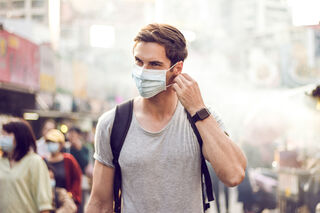Beauty
Can Wearing a Face Mask Make You More Attractive?
New study investigates how face coverings affect judgments of attractiveness.
Posted February 7, 2022 Reviewed by Michelle Quirk
Key points
- Attractiveness ratings differed according to which type of object was obscuring the faces.
- Surgical masks may serve as disease cues making the wearer appear less attractive.
- Mask wearing in the pandemic may be associated with social desirability and a considerate personality, rendering the wearer more attractive.

One of the abiding images associated with the coronavirus pandemic is the sight of people wearing surgical face masks. While there is evidence that this practice has reduced rates of infection, we may also wonder whether there may be further benefits to wearing masks. For instance, can they influence judgments of facial attractiveness, rendering the wearer as more attractive? It is possible that because masks may obscure facial defects in less attractive people, they serve to enhance overall judgments of facial attractiveness. Alternatively, it is possible that faces obscured by our masks may be judged as less attractive, because the mask may indicate that the wearer is unhealthy or is affected by disease. However, repeatedly over the last two years, the media have associated surgical masks with efforts to contain the coronavirus pandemic, ultimately rendering the wearers as somewhat more socially desirable.
Effects of Mask-Wearing on Judgments of Attractiveness
Researchers Oliver Hies and Michael Lewis from Cardiff University in the United Kingdom sought to investigate exactly how the wearing of masks might affect our judgments of the wearer’s facial attractiveness.
They employed female participants who were asked to rate the attractiveness of 40 different male faces that had been prejudged as either attractive or unattractive. Participants were randomly presented with the same face four times: obscured with a cloth mask, a surgical mask, a plain black book, or not obscured at all and were asked to rate each face presentation for attractiveness. The study was carried out seven months after the wearing of masks was made obligatory in the United Kingdom.
Participants all showed high levels of agreement with the statements, “Face masks have become part of everyday life in the past year,” and, “The use of face masks is effective in preventing the spread of COVID-19.” The study also confirmed that faces prejudged as low in attractiveness were judged as less attractive than those prejudged as higher in attractiveness.
Types of Face Coverings
The researchers also found a difference in attractiveness ratings according to which type of object was obscuring the faces presented to participants. More specifically, all faces were rated as more attractive when obscured by a surgical mask than when obscured by a cloth mask, a plain black book, or nothing at all. Furthermore, faces obscured by the cloth mask were rated as more attractive than the unobscured face, but not more attractive than the face obscured by the book. Finally, the faces obscured by the book were rated as more attractive than those that were not obscured. These differences in attractiveness ratings dependent on the type of mask or facial obstruction were roughly the same for the prejudged attractive and unattractive faces.
The authors conclude that while surgical masks might be a cue for disease, they are also indicative of a caring and considerate personality, possibly associated with attractiveness. Indeed, participants in the current study all reported agreement with the idea that masks can be effective in preventing the spread of coronavirus, which adds support to the explanation that wearers of masks are more socially desirable. Furthermore, the findings are in line with research by Viren Patel and colleagues (Patel et al., 2020) who found that surgical masks enhance the attractiveness of prejudged average and unattractive faces. Previous research has also found that women tend to rate male doctors as being more attractive if they are wearing a white coat. A similar effect could be at play here with surgical masks, indicating an association with the medical profession. However, it is unclear whether this medical professional connection persists when female faces are rated by males.
The current findings may, of course, vary in cultures where mask-wearing is more usual or customary, such as in Korea and Japan. In addition, it is possible that such positive attractiveness ratings of mask wearers may not persist after the coronavirus pandemic has properly ended and when attitudes to mask-wearing may have changed.
References
Hies, O. & Lewis, M. B. (2022). Beyond the beauty of occlusion: medical masks increase facial attractiveness more than other face coverings. Cognitive Research: Principles and Implications. 7 (1).
Patel, V., Mazzaferro, D. M., Sarwer, D. B., & Bartlett, S. P. (2020). ‘Beauty and the mask.’ Plastic and Reconstructive Surgery Global Open, 8 (8).


